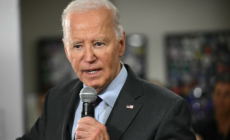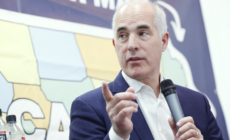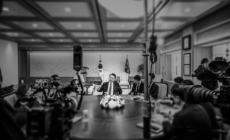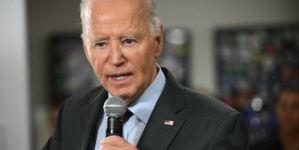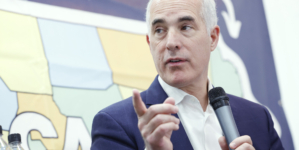-
Democrats Walked Into a Trap Republicans Set for Them - 21 mins ago
-
In Kamala Harris’ L.A. neighborhood, low-key quiet and cautious optimism - 22 mins ago
-
Will Joe Biden Pardon Hunter Before Donald Trump Returns to the White House? - 31 mins ago
-
Incoming LAPD chief’s proposed salary cut amid Police Commission drama - about 1 hour ago
-
China Reveals $1.4 Trillion Plan to Bail Out Local Governments - about 1 hour ago
-
Did Bob Casey Concede? Pennsylvania Senator Speaks Out as McCormick Wins - about 1 hour ago
-
Sharon Horgan’s Uncertain Yet Brilliant Path to Apple TV+’s ‘Bad Sisters’ - 2 hours ago
-
The election day freak-out: Some ways that L.A. is coping - 2 hours ago
-
On the Ballot, Abortion Rights Proved More Popular Than Kamala Harris - 2 hours ago
-
South Korean President Yoon Suk Yeol’s biggest problem isn’t North Korea - 2 hours ago
South Korean President Yoon Suk Yeol’s biggest problem isn’t North Korea

North Korea’s rhetoric was reaching fever pitch again. Unused roads and rail links to the South had just been blown up in a spectacular display of belligerence. The North had labeled the South “a hostile state” and its leaders as “gangsters” and “scum.”
It was not what South Korea’s President Yoon Suk Yeol wanted to talk about.
For while the threat of new conflict with the nuclear-armed North Korea has long loomed across the armistice line, the South’s domestic problems are growing—from the strains on its health care system to worries over the labor force to education. A deepening divide between genders, a collapsing birth rate and an aging population have set it on course for a demographic collapse as dramatic as any in the industrialized world.
“We need to make structural reform domestically,” Yoon told Newsweek in an interview in Seoul.

Soeren Stache/picture-alliance/dpa/AP
“The previous governments feared unpopular policies. They feared that they might lose the election, so they delayed and postponed what should have been done before, but now we no longer have enough time. We cannot postpone this forever.”
Only able to serve one five-year term, former prosecutor Yoon, 63, is now reaching the midpoint. His approval rating stood at 20 percent in a survey in September, the lowest since he took office in mid-2022. As well as pushback to his reform plans, Yoon has been targeted by opponents over the role of his wife, Kim Keon Hee. In April’s national assembly election, Yoon’s conservative People Power Party was defeated by the main opposition, posing another challenge to his drive for reforms that he describes as essential.
“I have no choice. I have no time to think about my approval rate or a midterm election, but I should get things done within my presidency, within my tenure. I need to solve this problem before I finish my term,” Yoon said. “I believe that though it wouldn’t be a completion of all policies, I will set a robust framework which will enable the next administration to finish all of this.”

ANTHONY WALLACE/AFP/Getty
South Korea’s Major Reforms
Yoon has set out to reform a health care sector that faces severe strains, because of the aging population but also because of urbanization that has left much of the country without the level of services in Seoul. Yoon’s plan to increase medical school admissions has prompted a strike by junior doctors, who say more doctors would lead to overtreatment and that the new doctors would likely avoid low paying areas and enter lucrative fields such as cosmetic surgery—of which South Korea has the highest rate in the world.
For Yoon, labor and education reforms are essential in an economy that, thanks to heavy industry and electronics, shot up from one of the world’s poorest economies when the Korean War ended in 1953 to rank as the 14th biggest in 2024. South Korea now faces a challenge from a more information-driven economy and the rise of artificial intelligence.
We need to work toward providing a better atmosphere, to ensure that, for example, marriage or child care is not a barrier for women’s promotion or their career.”
Yoon Suk Yeol
The pension system also requires reform—and higher contributions—if today’s working people will not be left short by the time they reach retirement age. Above everything looms the collapse in South Korea’s birth rate. It is a challenge facing most industrialized countries, but South Korea has the lowest of any major state. That is not helped by a gap that has been widening between women and men in a society that traditionally expected women to stay at home and raise children.
“It has no easy solution to reverse the course,” said Yoonkyung Lee, professor of sociology at the University of Toronto, who describes Korean politics as highly masculine and having a state-centered developmentalist ideology.
“This implies that they are unable to take gender inequality in Korean society seriously, to understand the structural causes of low birth rates and to devise policy solutions to address demographic challenges and to promote gender equality,” she told Newsweek.
Yoon, flanked by five male advisers, said that addressing the demographic crisis was a goal of his reforms and that keeping women happy in the workforce was a priority.
“We need to work toward providing a better atmosphere, to ensure that, for example, marriage or child care is not a barrier for women’s promotion or their career,” he said. “So that would be something that can resolve both the issue of gender divide and low birth rate at the same time.”
Taking greater advantage of AI was key, he said.
“It is more about expertise and creativity, which means that even though a woman leaves the office for several years because of marriage and child care, that does not mean that she loses her expertise or creativity,” he said. “We should not discriminate against that woman when she comes back to office by putting her on the bottom of the list for promotion.”

ANTHONY WALLACE/AFP/Getty
Yoon Suk Yeol’s Family Life
Yoon does not have children himself. On one of the walls of his offices is a large picture of a smiling Yoon and his wife playing on the floor with a group of puppies. They have six dogs and five cats at home. South Korea now has considerably more dogs than it does young children.
It is the role of Yoon’s wife that has brought him under some of his greatest political attacks and potentially complicated the reform drive. Kim has been cleared by prosecutors over accusations of stock manipulation and over receiving a Christian Dior handbag as a gift, but she has also been accused of influence peddling behind the scenes. The opposition is seeking a special counsel probe into her actions.
“Korea is probably not the only country in the world to hold the first lady to strict standards. At the same time, it is also true that the controversy surrounding my wife has become overblown due to the opposition parties’ excessive attempts to politicize this matter,” Yoon said. “The opposition parties are pushing for the appointment of a special prosecutor, which is nothing more than a political offensive and is regrettable. A special prosecutor is appointed when there are credible allegations of misconduct or breach of impartiality by prosecutors—which is not the case in this instance.”
An Approach to Domestic Reform
While the domestic reform plan may be taking up more of Yoon’s efforts, North Korea has not gone away—as it reminds its southern neighbor frequently with colorful rhetoric, occasional missile tests and, more recently, ballons full of trash floated over the demilitarized zone. It says those are a response to South Korean drones dropping propaganda leaflets over the North.
Yoon has been tougher on the North than his predecessor. At a reunification display at a border viewpoint, Korean leaders have detailed their hopes for reunification in calligraphy. Standing out from the more florid messages, Yoon’s simply reads: “freedom, peace and unification.”
“One way to characterize Yoon’s approach would be ‘harsh wind policy’ (in contrast to the ‘sunshine policy’ of his predecessor) to bring about a pressure-induced transformation of North Korea,” said Jong Eun Lee, an assistant professor of political science at North Greenville University in South Carolina.
I believe that it would be irrational for [the North] to decide to wage a nuclear attack against the Republic of Korea.”
Yoon Suk Yeol
“South Korean society has largely become ‘numbed’ to seemingly endless rhetoric and actions from the North. However, North Korea’s behavior, even if it does not lead to ‘war,’ still poses two major challenges for South Korea.”
Those were potential strain on the alliance between the United States and South Korea and the diplomatic challenge of North Korea’s alliances with other “revisionist” states such as Russia, he said.
Threats from North Korea to South Korea
Yoon said South Korea was prepared for any threats from North Korea in its alliance with the United States. He said that because it could rely on U.S. nuclear weapons it does not need its own, even though polls show most South Koreans would support it developing its own nuclear weapons. “I believe that it would be irrational for them to decide to wage a nuclear attack against the Republic of Korea and should they do so the nuclear-based ROK-U.S. alliance will immediately strike North Korea with the U.S. nuclear weapon,” he said.

JUNG YEON-JE/AFP/Getty
Yoon did not say there would be any new measures to appease North Korea and its Supreme Leader, Kim Jong Un, beyond the message he had set out two years ago.
“I made it clear that if North Korea embarks toward a clear path for denuclearization, we will provide a security guarantee and we will improve the livelihood of its people in a remarkable manner. We will provide audacious economic and industrial support for them,” he said.
South Korea’s Security
South Korea’s security depends on its international alliances and Yoon has worked to strengthen those even as he has been preoccupied by the challenges at home. The key alliance is with the United States, which still has nearly 30,000 soldiers in the country. Yoon said he was confident of U.S. support no matter who is in the White House. He has also worked to strengthen the relationship with their common ally Japan, a sensitive subject for Koreans given its history as a colonial occupier and abuses that included the forcing of Korean women into sex slavery.
“In the 21st century, almost every country which suffered from imperialist rule now has a better and good relationship with the former imperialist country,” Yoon said. “I believe that this should be applied to the Korea-Japan relationship as well. Also, now we share a common security interest when it comes to North Korea’s nuclear and missile threat.”
But as South Korea has been working to strengthen its alliances, North Korea has been doing likewise—and particularly with Russia. Not only has North Korea provided armaments to support President Vladimir Putin’s invasion of Ukraine, but also soldiers, Seoul says.

Vladimir Smirnov, Sputnik, KremlinPhoto/AP, File
South Korea and China
South Korea also keeps a wary eye on increasingly powerful China. Yoon has shown growing support for Taiwan in the face of Beijing’s threats to take over the self-governing island, which it regards as a breakaway province.
South Korea has also worked to improve its relationship with Southeast Asian nations that share concerns of Chinese regional domination.
“The cause of free and democratic nations is to defend ourselves, defend our societies and not to invade others. In contrast, the authoritarian regimes, the autocracies, the reason they wage war is to solidify their domestic power,” Yoon said.
“I have a strong belief in the victory of the free and democratic nations, and I will say it is not just a belief, it is a religion for me.”
To read how Newsweek uses AI as a newsroom tool, Click here.
Source link




